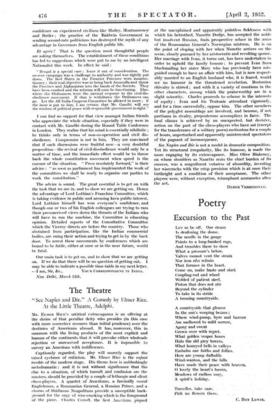The Theatre
"See Naples and Die." A Comedy by Elmer Rice. At the Little Theatre, Adelphi.
Ma. ELMER Rice's satirical extravaganza is an offering at the shrine of that peculiar deity who presides (in this case with more corrective resource than initial prudence) over the destinies of Americans abroad. It has, moreover, this in common with the living products of the most explicit and human of the continents that it will provoke either wholesale rejection or unreserved acceptance. It is impossible to survey an American with indifference.
Captiously regarded, the play will scarcely support, the raised eyebrow of criticism. Mr. Elmer Rice is' the enfant terrible of the modern stage. His theme here is unblushingly melodramatic and it is not without significance. that the clue to a situation, of which tumult and confusion are the masters, should be provided by a couple of lethargic and silent chess-players. A quartet of Americans, a farcically moral Englishman, a Roumanian General, a Russian Prince, and a chorus of libidinous Neapolitans provide a susceptible back- ground for the orgy of wise-cracking which is the foreground of the piece. Charles Carroll, the first American, piqued at the unexplained and apparently pointless fickleness with which his betrothed, Nanette Dodge, has accepted the noble but insolvent Russian, finds prospective solace in the arms of the Roumanian General's Norwegian mistress. He is on the point of eloping with her when Nanette arrives on the scene, closely pursued by her aristocratic and revolting spouse. Her marriage with Nair, it turns out, has been undertaken in order to uphold the family honour ; to prevent Ivan front blackmailing her sister Mary who has previously been mis- guided enough to have an affair with him, but is now respect- ably married to an English husband who, it is feared, would see no humour in the threatened revelation. Bostonian Chivalry, is stirred ; and with it a variety of emotions in the other characters, among which the praiseworthy are in a slight minority. Charles proceeds to scheme in the interests of equity : Ivan and his Teutonic attendant vigorously, and for a time successfully, oppose him. The other members of the polyglot assemblage are involved, and become, if not partisans in rivalry, preposterous accomplices in farce. The final climax is achieved by an unexpected, but decisive, action on the part of the chess-players who have sat (except for the transference of a solitary pawn) motionless for a couple of hours, unperturbed and apparently uninterested spectators of the pageant of inconsequence.
See Naples and Die is not a model in dramatic composition. Yet its structural irregularity, like its humour, is made the more engaging by its extravagance. Miss Olive Blakeney, on whose shoulders as Nanette rests the chief burden of its success, was a magnificent votaress of absurdity, investing her wisecracks with the crisp precision which is at once their birthright- and a condition of their acceptance. The other players were, without exception, triumphant accessories after the act.
DEREK VERSCHOYLE.
































 Previous page
Previous page